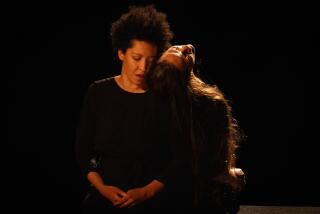Music Reviews : Soprano Blackwell in Local Debut
- Share via
She doesn’t look to weigh much more than 90 pounds and her lyric soprano aptly threads its shimmering way to the stratosphere, but don’t count on Harolyn Blackwell to stay within the narrow confines of her voice category: high, small, agile.
At least that is what the Metropolitan Opera newcomer seemed to signal at her local debut recital Saturday at Ambassador Auditorium, a wholly pleasurable, sometimes even thrilling, occasion.
Blackwell may not yet know how to court an audience, how to sense her own command, how to bask in the spotlight or create an aura--if, indeed, any of those elements still gets play among today’s recitalists.
Nor did it help to have the piano--at which the superb Warren Jones presided--competing for attention (with the keyboard angled toward the audience and an equal division existing between the two artists).
But Blackwell certainly can leap with her whole being into the music at hand and find and deliver its moment. Whether singing the songs of Purcell or Rachmaninoff or Richard Strauss or those 10 written especially for her--Ricky Ian Gordon’s “Genius Child”--settings of Langston Hughes poems--the soprano illuminated their essence.
What’s more, she used her good instincts across stylistic borders. In the Purcell, she concentrated on subtly graded dynamics and made each item a thing of dramatic contrast, ending the set with a full arsenal of coloratura effects.
The Rachmaninoff, which followed, became the stuff of ecstasy as her voice soared along a rhapsodic line in full-throated outpourings, while the Strauss group was delivered with an idiomatic forward placement and purity of tone that emphasized her musical poise and expressive depth.
Even with only passable language skills (in German, Russian and French) the petite singer did not fall short of the mark. Her comic bravado as Clorinde in Nicolo’s “Cendrillon,” delivered the pyrotechnics while mocking them.
In the U.S. premiere of the Gordon song cycle, Blackwell enjoyed music that showed off her versatility to great effect. In a post-Copland tradition, the songs proved varied in mood and meter, sparsely written with wide but not jarring intervals and eminently singable, even compelling.
Blackwell returned the favor to Gordon--splendidly. She granted three delectable encores: “Summertime” and two spirituals.
More to Read
The biggest entertainment stories
Get our big stories about Hollywood, film, television, music, arts, culture and more right in your inbox as soon as they publish.
You may occasionally receive promotional content from the Los Angeles Times.










